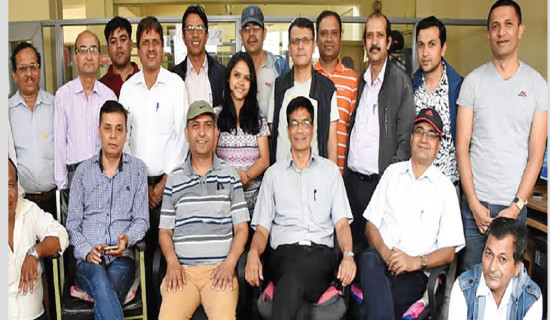- Monday, 23 February 2026
One Year of Government Special Supplement
Significant Progress Made In Healthcare
Nepal, based on Article 35 of the constitution, has recognised the "Right to Health" as a fundamental right, ensuring citizens' access to basic healthcare services. Despite commendable progress in the past two decades, challenges persist in achieving universal coverage and meeting SDG targets by 2030. The healthcare sector, which has faced significant challenges due to the COVID-19 pandemic , is now witnessing positive developments under the leadership of Prime Minister Pushpa Kamal Dahal 'Prachanda'.
Over the past year, Nepal has witnessed notable improvements in major health sector indicators, showcasing the government's strategic decisions and initiatives. Key healthcare institutions like Bharatpur and Bheri Hospitals have transitioned into regional hospitals under the National Institute of Medical Science, signifying a commitment to strengthening healthcare services at both local and national levels. The promotion of the Tilganga Eye Institute to a World University underscores the government's dedication to advancing medical education, particularly in ophthalmology. Collaborating with Nepal Pharmacy Limited to domestically produce 18 essential medicines reflects a substantial stride towards pharmaceutical self-reliance, ensuring a stable supply for all citizens.
Global recognition of Dr. Ruit
The global recognition of Dr. Sanduk Ruit by the Bahrain government and the ISA Award for Service to Humanity attest to the calibre of healthcare professionals in Nepal, highlighting the country's global healthcare expertise. The proposed scholarship bill for health science institutes underscores a commitment to nurturing the next generation of healthcare professionals, emphasising the significance of investing in education and training for a resilient healthcare workforce. Infrastructure development has been a focal point, with the government completing the construction of basic hospitals at 655 local levels. This widespread effort aims to bring healthcare closer to communities, ensuring even remote areas have access to essential services. Technological advancements, such as the O.P.D. registration system and a healthcare records app, enhance efficiency and improve overall patient records by offering timely and accessible services.
The provision of free health services for both general and economically disadvantaged citizens in federal and provincial hospitals reflects inclusivity, overcomes healthcare disparities, and ensures accessibility. This initiative supports the overarching goal of achieving universal healthcare coverage and promoting a more equitable distribution of health resources.
As the government continues its positive trajectory in the health sector, several transformative initiatives are shaping the future of healthcare in the country. They include legal safeguards, social health integration, vaccination drives, elderly care focus, and preventive healthcare measures. Recognising the importance of a robust legal framework, the government is actively strengthening its legal system to ensure the safety of health institutions, doctors, and health workers.
The Amendments to the Safety of Health Workers and Health Institutions Act, 2022, are underway, providing a protective shield for those on the frontlines of healthcare. This legal safeguard is crucial for fostering a secure environment for healthcare professionals and ensuring the continuity of essential health services. The Government is making headway in integrating social health security programmes into health insurance initiatives. The establishment of Social Service Units (SSUs) in all hospitals aims to enhance the social health protection network, ensuring a safety net for citizens across the country. This integration is a critical step towards creating a comprehensive healthcare system that addresses not only immediate healthcare needs but also provides long-term financial security.
As a commitment to seniors, specialised health services are being developed. Initiatives include the development of the Geriatric Health Services Strategy and Senior Citizens Health Services Operation Standards. The groundwork for specialized health services for the elderly is being laid, with an interoperability framework and telemedicine services in operation. This focus on elderly care acknowledges the changing demographics of the population and aims to provide tailored healthcare services that address the unique needs of the elderly. The prepared proposal for the organisation and management survey of 500-bed hospitals is currently under discussion with various ministries and stakeholders. An agreement process has been initiated to provide free access to 35 types of medicines for cancer treatment in children. The construction of laboratories is underway in seven provinces.
The App system for O.P.D. registration for insured individuals in some federal hospitals and institutions has been implemented. Additionally, an app has been introduced to keep records of lab reports, eliminating the need to stand in long lines. During the past year, free general health check-ups and treatments have been made available to 3,523 impoverished and vulnerable citizens in federal and provincial hospitals. Satellite clinics have been established at five institutions and seven federal hospitals. In collaboration with local authorities, 300 centres have conducted civic health campaigns.
Free health services
According to the Ministry of Health and Population (MoHP), 10 per cent of total beds in government hospitals are reserved for impoverished, helpless, and disabled patients, and information about this is publicly available. The system includes displaying information on notice boards and electronic boards. To bolster cancer diagnostics and treatment, the government is set to purchase a Pet Scan Machine and a Cyclotron Production Machine. However, the logistical challenges, particularly the lack of space for installation, are being addressed. The focus on cancer extends to launching a vaccination programme against cervical cancer, with significant progress in screening initiatives. This comprehensive approach to cancer care addresses both prevention and treatment.
The vision for the Shaheed Dharmabhakta National Transplantation Centre is taking shape, aiming to produce specialists in organ transplantation. Free kidney transplant services for the economically challenged are underway, with 321 kidney patients benefiting from this initiative. This initiative not only addresses a critical healthcare need but also promotes inclusivity by ensuring that life-saving treatments are accessible to all segments of the population. By collaborating with health science academies and medical colleges, the government is promoting community engagement through free health camps. These camps, conducted twice a year, facilitate the exchange of health technology and experiences.
Additionally, various institutions, like the National Academy of Medical Sciences and B.P. Koirala IHS, are providing free health services, contributing to healthcare accessibility. The establishment of laboratories in provinces and ongoing discussions on medical research within the Ministry of Law, Justice, and Parliamentary Affairs show a commitment to advancing research and diagnostic capabilities. This decentralised approach is crucial for ensuring that healthcare services are accessible and tailored to the specific needs of different regions.
While acknowledging these positive developments, it is imperative to address systemic issues such as corruption, anomalies, and shortages of infrastructure, medical equipment, the workforce, and essential medicines. These achievements are expected to greatly improve the overall health and enhance the well-being of the people. The government's dedication to ongoing improvements and transformative strategies positions Nepal's healthcare system for continued success in meeting the evolving healthcare needs of its population.
(Rijal is a journalist at The Rising Nepal)
















